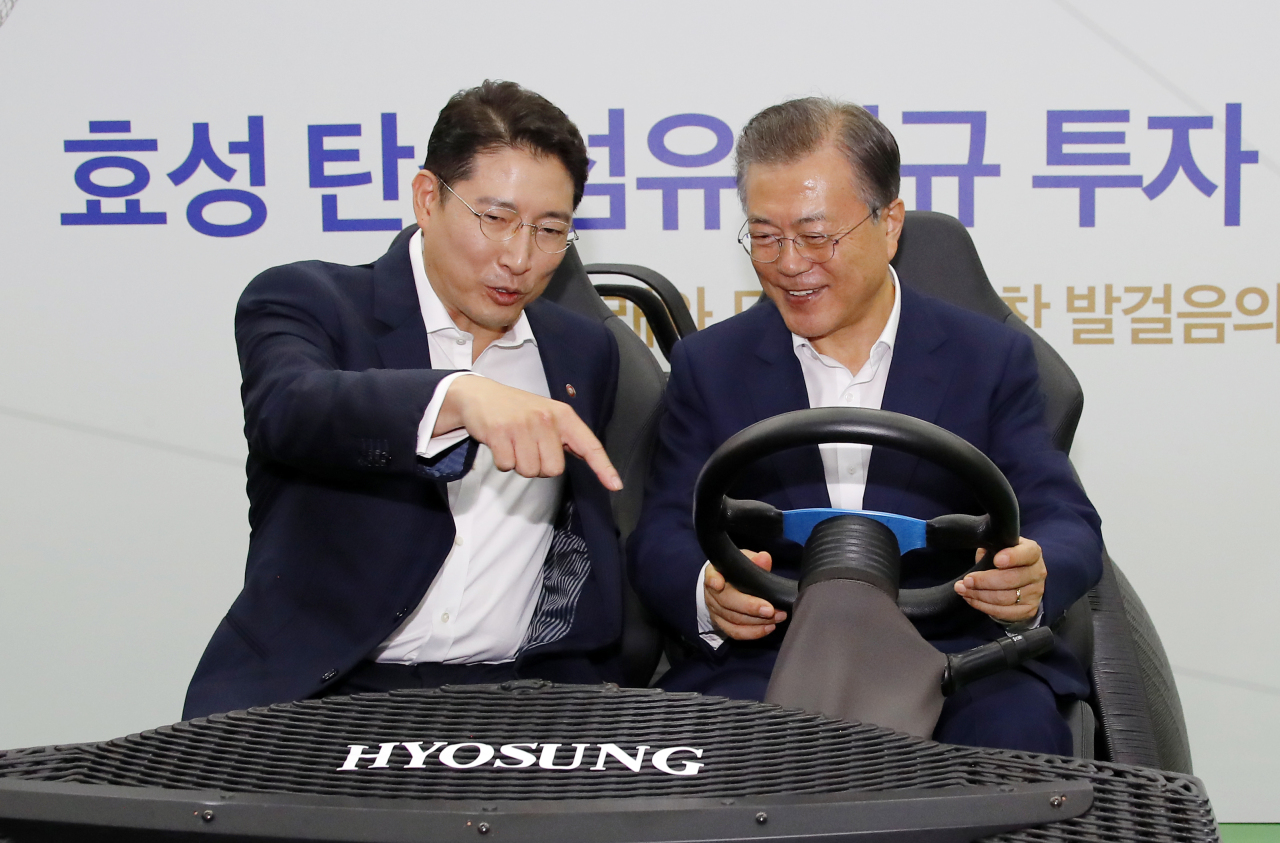Hyosung to invest W1tr in carbon fiber, aims to become global top 3
President Moon urges to strengthen Korea’s competitiveness in material businesses, touts Hyosung’s investment
By Cho Chung-unPublished : Aug. 20, 2019 - 16:21
South Korea’s Hyosung announced Tuesday it will invest 1 trillion won ($829 million) by 2028 to expand its carbon fiber production capacity, vowing to raise the country’s competitiveness to lessen dependence on other countries.
To achieve this, it will put advanced materials, crucial for the “hydrogen economy,” at the forefront of its business portfolio.
The textile giant plans to start 10 production lines for carbon fiber manufacturing at its plant in Jeonju City, capable of producing 24,000 tons of the material a year--- the largest in the world for a single plant.
The 1 trillion-won investment will help Hyosung become the third-largest carbon fiber producer in the world, with an estimated market share of 10 percent. Currently, the company is the 11th-biggest player in terms of carbon fiber production size, supplying 2 percent.
The announcement was made during a visit by President Moon Jae-in to Hyosung’s plant in Jeonju, North Jeolla Province, on Tuesday afternoon.
To achieve this, it will put advanced materials, crucial for the “hydrogen economy,” at the forefront of its business portfolio.
The textile giant plans to start 10 production lines for carbon fiber manufacturing at its plant in Jeonju City, capable of producing 24,000 tons of the material a year--- the largest in the world for a single plant.
The 1 trillion-won investment will help Hyosung become the third-largest carbon fiber producer in the world, with an estimated market share of 10 percent. Currently, the company is the 11th-biggest player in terms of carbon fiber production size, supplying 2 percent.
The announcement was made during a visit by President Moon Jae-in to Hyosung’s plant in Jeonju, North Jeolla Province, on Tuesday afternoon.

“To make (South Korea) a responsible economic powerhouse, we should lessen dependence on core materials from certain countries,” said Moon at the investment ceremony. “This starts now. We can demonstrate the strength of South Korea as a manufacturing powerhouse.”
Hyosung was the first Korean company to develop carbon fibers in 2011. It was the fourth country to develop homegrown carbon fiber technology, after Japan, the US and Germany.
The country is a leader in hydrogen energy technology, particularly in the auto sector, but it has been depending on carbon fiber made in Japan for production of fuel storage tanks.
Moon’s visit to Hyosung’s plant was widely viewed as part of his drive to enhance competitiveness of high-tech materials and chemicals amid a trade row with Japan.
While touting the company’s investment plan, saying that its “confidence” and “resolute determination” is being felt in the process of turning a crisis into an opportunity, Moon urged companies to join efforts in developing homegrown and exclusive technologies.
“Taking a step forward, we need to promote competitiveness of core industries through manufacturing renaissance strategy, and support new industries such as system chips, bio health, future mobility and hydrogen economy to take a lead role in the fourth industrial revolution,” the president said.
In the presence of Moon, Hyosung signed a memorandum of understanding with the Ministry of Industry, Trade and Energy, Iljin Composite, a local supplier of hydrogen tanks, and Korea Aerospace Industries, the nation’s sole aircraft manufacturer, to forge an alliance for carbon fiber tests.
The plan came amid growing market demand for carbon fiber. By 2030, the market for hydrogen fuel tanks is estimated to grow more than 120 times, according to the company.
In 2013, Hyosung started operate a carbon fiber plant with annual production capacity of 2,000 tons in Jeonju. It has been building another 2,000-ton carbon fiber plant in Jeonju since February.
Hyosung’s plan came in line with the Korean government’s hydrogen drive aimed at reducing the use of fossil fuels and creating new industries to foster economic growth. In a comprehensive plan unveiled in January, the government said it would increase the number of hydrogen-powered vehicles to 6.2 million by 2040. Carbon fibers are fibers that weigh one-fourth less than steel but are 10 times stronger. They are vital materials necessary for safe storage, transportation and the use of hydrogen energy.
While expressing his appreciation to the Moon administration for expanding the market potential for carbon fiber, Hyosung Chairman Cho Hyun-joon said the company would continue investments in the material to contribute to the state’s efforts in strengthening Korea’s competitiveness in material businesses.
“(Hyosung) started to exclusively develop carbon fiber, having its potential in mind,” he said. “As the market potential of carbon fiber is infinite, and also with (the government) opening (the door) for the new market of carbon fiber through the hydrogen economy (initiative), we will take part in building South Korea (into) a material powerhouse by nurturing the business.”
By Cho Chung-un (christory@heraldcorp.com)



![[Exclusive] Korean military set to ban iPhones over 'security' concerns](http://res.heraldm.com/phpwas/restmb_idxmake.php?idx=644&simg=/content/image/2024/04/23/20240423050599_0.jpg&u=20240423183955)

![[Graphic News] 77% of young Koreans still financially dependent](http://res.heraldm.com/phpwas/restmb_idxmake.php?idx=644&simg=/content/image/2024/04/22/20240422050762_0.gif&u=)



![[Pressure points] Leggings in public: Fashion statement or social faux pas?](http://res.heraldm.com/phpwas/restmb_idxmake.php?idx=644&simg=/content/image/2024/04/23/20240423050669_0.jpg&u=)










